Ryan Murphy's The Politician is decadent, entertaining, but kind of a mess


Before stepping into the gilded halls of Santa Barbara’s Saint Sebastian High School, it is important to understand that the student body is embroiled in a very lengthy, wildly involved class election. The stakes here extend beyond dreams of curating vending machine snacks or booking Drake for the next prom: One candidate is fighting for their ascent to political greatness, and his boundless ambition leads him to resort to confounding lengths to secure any sort of leg-up. Unfortunately for him, he finds himself surrounded by opponents in nearly every facet of his life who are no less ruthless or desperate. It’s an almost foolproof formula for an undoubtedly entertaining block of television, even if The Politician’s execution is oftentimes messy and unwieldy.
The series follows the intense presidential campaign of Payton Hobart (Ben Platt), a high school senior with a concrete, obsessively researched plan to one day join the pantheon of historic U.S. presidents. His eventual domination begins with becoming leader of the student council—a victory that, in his mind, will ensure his acceptance into Harvard as well as his path to the White House—but his candidacy is hotly contested by Astrid (Lucy Boynton), a girl largely fueled by tragedy and a vendetta. Platt is marvelous as a young man swallowed by the miasma of his own determination and while there are times when his development inexplicably shifts sideways, the moments when Payton deeply questions his morality add welcomed texture. His demeanor, as well as the narrative itself, have already been compared to Tracy Flick and 1999's Election, but a sizable portion of the show’s overall timbre can also be likened to a tone popularized by Wes Anderson: sharp, quick, and detached. It feels somewhat new for Ryan Murphy, but it works within context (especially when it’s employed by Georgina Hobart, portrayed by Anderson alum Gwyneth Paltrow).
In comparison, Astrid—like a number of women throughout the series—feels like a missed opportunity to provide a believable foil for Payton. Though the disdain between him and Astrid is palpable, her motives don’t translate nearly as clearly as her opponent’s, making what should be a fierce adversary somewhat forgettable. Astrid’s running mate, Skye (Rahne Jones), is cunning, witty, motivated, and armed with enough audacity to render her position as a secondary figure a mystery.
Skye isn’t the only spotlight-worthy VP hopeful at Saint Sebastian. Payton manipulatively taps Infinity Jackson, a sickly but spirited firecracker, to join his ticket as an easy net for sympathy votes. Played by Zoey Deutch, Infinity is more than capable of weathering a veritable shitstorm like Payton, and her comedic timing and quiet strength make her (and Deutch) just as formidable of a figure, mousy voice and all. Speaking of terrifying: If Jessica Lange’s residency as the Looming Evil in Ryan Murphy productions ever feels akin to typecasting, it’s likely because there are few actresses that have honed the slick drawl and glare of dubious intent to spine-tingling perfection. As Infinity’s grandmother Dusty, Lange blurs the lines between unhealthy love and toxic self-interest while perpetuating a wholly relatable “eat the rich” mentality. Does she ultimately need to be defeated? Sure, but not without stealing at least three more scenes on her potential way out, please and thank you.
The Politician largely benefits from the heightened elements that are downright Murphian in tone and aesthetic: There’s no shortage of gloss, entitlement, absurdly decadent scenery, and intrigue, intrigue, intrigue. With a few cult favorites under their belts, Murphy, Ryan Falchuck, and Ian Brennan are attuned to what their audience wants (including a handful of impressive musical numbers from Platt). So it’s understandable as to why the eight-episode first season hits the ground running, immediately submerging viewers in Payton’s unrelenting moxie. Still, while the pacing lends itself to a final product that shirks boredom at every turn, the eagerness to keep the audiences guessing leads to twists that don’t feel entirely earned—moments that would resonate way more if the show slowed down and gave us an opportunity to get to know the other characters as thoroughly as Payton or Ivory. Cramming Glee-sized drama, which usually took a minimum of 13 episodes to gestate, into just eight episodes proves to be a challenge here, resulting in moments that are less shocking and more fodder.
Perhaps the most notable element of The Politician’s pacing is that it is clearly structured from the perspective of creatives who have been guaranteed a second season. That’s not exactly a revelation: It was well reported that Netflix ordered two seasons of the dark comedy from the beginning. But that knowledge comes in handy for the eighth episode, where the narrative switches gears and illuminates, arguably, the most riveting aspect of Payton’s story. (It’s also the best episode of the season, making the first seven seem like exposition that you have to just get through.) Even as the majority of the first season can feel frustratingly rough, the finale does succeed in setting up a properly outrageous second season.
The Politician’s allure lies more with what the show actually does than what it tries to do. In theory, the satire aims to take down the 1% by holding up a mirror to its ugliest tendencies. Whether or not it actually accomplishes that remains to be seen. But what it does manage to show—which is, as Murphy himself once described, “wealthy people behaving badly”—is enough of a reason to tune in and have a good enough time.
Binge reviews by Eric Thurm will run Friday, September 27 through Sunday, September 30.